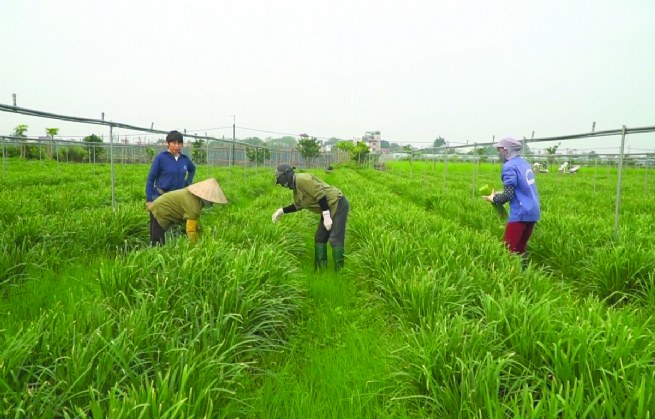Determining that one of the key tasks is to ensure food safety for people, Hanoi will focus on carrying out consistent solutions to foster production, promote safe vegetable consumption and develop concentrated organic vegetable areas.

Hanoi is adopting consistent solutions to develop organic vegetable areas
Due to practical difficulties and barriers, many large safe vegetable producers and traders in Hanoi proposed that the city have a policy on land allocation and land lease, based on the price bracket prescribed by the government, along with other specific mechanisms for cooperatives to invest in building working offices, vegetable processing areas, and high-tech cold houses for preservation and production.
Vice Chairman of Thuong Tin District People's Committee, Bui Cong Than said, the output of organic vegetables still depends on merchants and low prices hinder quality improvement. Therefore, the city needs to further promote incentive policies to encourage businesses to invest and engage in production and purchase products from cooperatives and farmers.
Vice Chairman of Thanh Oai District People's Committee, Nguyen Trong Khien said that the district will continue to expand, maintain and promote the strengths of a more than 3,000-ha commercial rice production area, a 300-ha fruit growing area, and 100-ha organic farming area in the coming time. Besides, the district will develop link chains: A-Z organic food chain of Hoang Long Cooperative (Tan Uoc commune), Boi Khe fragrant rice chain (Tam Hung commune), and Lien Chau duck egg chain (Lien Chau commune). At the same time, the district supports scaling up high-tech flower-growing models and melon-growing models in the locality.
Deputy Director of Hanoi Department of Agriculture and Rural Development, Nguyen Ngoc Son said that the agricultural sector continues to coordinate with local authorities to expand centralized production associated with high-tech applications, ecological agriculture, organic agriculture and advanced quality management systems. Hanoi will invest intensively in established agricultural production areas by upgrading production infrastructure, branding products and supporting marketing and sale. As for fruit trees, the city will focus on specialized farming areas for grapefruit, banana, longan and other crops (more than 20,000 ha), vegetables (over 5,000 ha), and flowers and ornamental plants (over 9,000 ha).
To accomplish the above goals, Hanoi will continue to introduce policies to support infrastructure, branding and chain connectivity to provide organic foods for Hanoi consumers.
In addition, Hanoi's agricultural sector will continue to build community communication and supervision models on food safety in new rural communes for dissemination and replication. At the same time, the sector will coordinate with the Farmers' Union and the Women's Union to inform and mobilize people to produce and trade in quality and safe agricultural products and foods for public health. In addition, the Department of Agriculture and Rural Development will also focus on monitoring and inspecting food quality and safety along the value chain; promptly detect, warn and strictly handle violations of food safety; continue to build and develop some new brands of locally advantageous agricultural products.
By Dinh Bao, Vietnam Business Forum